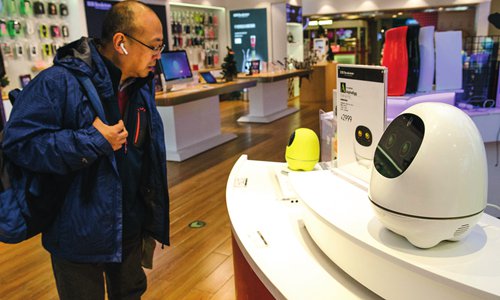
A customer interacts with a household robot in a high-tech product store. (Photo: Li Hao/GT)
The commercialization of artificially intelligent products ushers in a new era of communication and companionship
Vivian Li's apartment has been very lively of late. The sound of music, chatting and singing can be heard bouncing off the walls every day. But Li, 28, who lives alone, is not having a party, at least not the traditional kind. She is merely enjoying the company of her new artificially intelligent (AI) product, an audio box.
"It brings me a lot of joy and is comparable to what we have in phones, such as Siri. New AI products are more natural communicators, and I can clearly tell that they are more 'intelligent,'" said Li.
The year 2017 has widely been described as the start of AI application and commercialization. As the world's second-largest economy by GDP, China has been one of the leading forces in the "fourth industrial revolution" led by Internet and AI technology. During the past two years, numerous AI start-ups have mushroomed in China, and the government has also taken notice.
Earlier this year, the State Council published a development plan for AI technology, making it a national strategy for the first time. Self-driving buses based on AI technology started trials earlier this month in Shenzhen, Guangdong Province, and on December 13, Google announced its plan to establish a Google AI China Center in Beijing, acknowledging China's importance in the AI industry.
A search on online shopping platforms such as TMall and JD.COM brings up AI products, including audio and vehicular devices, translators and household robots at prices ranging from hundreds to tens of thousands of yuan. The high-tech products have already begun to change the lives of ordinary people.
Li bought her device online for less than 100 yuan ($15.11) during the recent Double Eleven shopping festival. Since her purchase, it is almost as if Li and the device have become pals. She talks to it, asks it to tell stories, plan her schedules, translate and play music.
"Whenever I call it, it answers, 'Yes, I'm here,'" Li said of her new companion. "It's almost as if the AI era I often hear about on the news is here."
A high-tech lifestyle
Li thinks AI devices have the potential to help people live richer and fuller lives, not just for simple things like conversation but also for creating a more efficient home.
"[AI devices] can become central controllers that connect to other household devices, say a fridge or lamp, as long as you buy the same brand of products," Li said. "AI is upgrading the concept of 'smart home.' I would like to try it one day."
Liu Xin, 33, the mother of a three-year-old girl, no longer needs to rush home after work. With the simple press of a button, she can see how everything is going at home, "walk across" every corner of her apartment and say hi to her daughter and her nanny - thanks to a little robot.
"It really makes my life easier. I feel much more at ease and can concentrate on my job more," said Liu, who works in Beijing.
As a working mother with a young child, she occasionally has a hard time being away from her daughter.
"My parents are in their 60s and not able to come and help, and my husband and I get off work very late every day, so we have to rely on our nanny to take care of our daughter," she explained.
The recent news of child abuse by so-called trusted caregivers do little to ease her mind. So, Liu was relieved when her family purchased the robot.
"My daughter can call me by simply telling the robot she wants me, and that's quite convenient," said Liu.
Apart from being an open source of contact between parent and child, the robot is also a kind of educational playmate for the three-year-old. Liu said her daughter has learned more than 50 songs from the robot so far and has started to learn basic math. The robot also teaches some social skills.
"Sometimes my daughter would lose her temper and slap it, and it gets angry. Then she would tickle or pat it to make it laugh. That's fun," said Liu.
She has already recommended the robot to two of her friends and is looking forward to purchasing more advanced AI products for the family.


















































